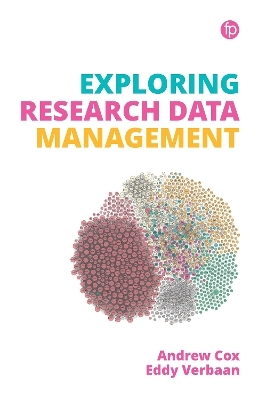
Exploring Research Data Management
Facet Publishing (Verlag)
978-1-78330-279-6 (ISBN)
Research Data Management (RDM) has become a professional topic of great importance internationally following changes in scholarship and government policies about the sharing of research data. Exploring Research Data Management provides an accessible introduction and guide to RDM with engaging tasks for the reader to follow and develop their knowledge. Starting by exploring the world of research and the importance and complexity of data in the research process, the book considers how a multi-professional support service can be created then examines the decisions that need to be made in designing different types of research data service from local policy creation, training, through to creating a data repository. Coverage includes:
A discussion of the drivers and barriers to RDM
Institutional policy and making the case for Research Data Services
Practical data management
Data literacy and training researchers
Ethics and research data services
Case studies and practical advice from working in a Research Data Service.
This book will be useful reading for librarians and other support professionals who are interested in learning more about RDM and developing Research Data Services in their own institution. It will also be of value to students on librarianship, archives, and information management courses studying topics such as RDM, digital curation, data literacies and open science.
Andrew Cox is a senior lecturer at the Information School, University of Sheffield and led the RDMRose Project. His research interests include virtual community, social media and library responses to technology. He coordinates Sheffield’s MSc in Digital Library Management. Eddy Verbaan is Head of Library Research Support at Sheffield Hallam University. He established a Research Data Management infrastructure at Sheffield Hallam University and worked as a Research Associate at the Information School, The University of Sheffield, on RDM-related projects. He has a PhD in history and an MSc in Digital Library Management.
1. Introducing research data management Aims A thought experiment RDM Why is RDM important now? What does the practice of supporting RDM actually involve? Who is this book for? About the book Further reading
2. The social world of research Aims Introduction The research landscape The organisation of research The research lifecycle The experience of research: research and identity Further reading
3. What are research data?
Aims Research data are important to (some) researchers Types of research data Some definitions of research data Data collections Data lifecycles Research data is complex Information management and RDM Further reading
4. Case study of RDM in an environmental engineering science project Aims The project The research method The data The challenge of metadata The need to foster a culture around metadata Data sharing Talking to researchers Further reading
5. RDM: drivers and barriers Aims Introduction E-research The ‘crisis of reproducibility’ Open science Government and funder policy Policy developments Journal policies FAIR data principles Data citation RDM and the new public management Drivers and barriers Barriers Further reading
6. RDM as a wicked challenge Aims Types of problem The wicked challenge concept Is RDM wicked? Leadership in a wicked challenge context Further reading
7. Research data services Aims Research data services (RDS) Vision, mission, strategy and governance Stakeholders Supporting research Further reading
8. Staffing a research data service Aims New activities and roles Who does what? The collaborative research data service New skills and roles Further reading
9. Requirements gathering for a research data service Aims Finding out more about an institution Surveys Interviews and focus groups Further reading
10. Institutional policy and the business case for research data services Aims Writing a policy Developing a policy Content of a policy Layout and style Using and updating the RDM policy
11. Support and advice for RDM Aims Offering support and advice Making the RDS visible Frequently asked questions The RDM website Key challenges for advice and support
12. Practical data management Aims Introduction Personal information management Risks and risk management File organisation and naming Back-ups of active data Promoting practical data management Further reading
13. Data management planning Aims The data management plan The benefits of DMPs The content of a DMP Reading an example DMP Common pitfalls Supporting data management planning Further reading
14. Advocacy for data management and sharing Aims Introduction Drivers for data sharing What should researchers do to promote data use and re-use? Panda talk Some responses Changing the culture Further reading 15. Training researchers and data literacy Aims Introduction Step 1: Who is the training for? Step 2: What topics need to be covered? Step 3: Who should deliver the training? Step 4: How should the training be delivered? Making and re-using educational resources Step 5: How is the training to be made engaging? Step 6: Evaluating training Getting the right mix Further reading
16. Infrastructure for research data storage and preservation Aims Technical infrastructure The repository Selecting data for deposit Preparing data: metadata and documentation Preparing data: file formats Ingest Providing access to consumers Further reading
17. Evaluation of RDS Aims Introduction Principles of evaluation Measuring impact A balanced scorecard approach Maturity models Further reading
18. Ethics and research data services Aims An ethical service Research ethics Dilemmas for RDS Ethics in professional relationships Further reading
19. A day in the life working in an RDS Aims RDM in practice Strategic development Advocacy, training and support Repository work RDM day to day
20. Conclusion: the skills and mindset to succeed in RDM Aim Working in RDM Your career plan and RDM Keeping up to date
| Erscheinungsdatum | 23.07.2018 |
|---|---|
| Verlagsort | London |
| Sprache | englisch |
| Maße | 155 x 242 mm |
| Gewicht | 199 g |
| Themenwelt | Informatik ► Datenbanken ► Data Warehouse / Data Mining |
| Sozialwissenschaften ► Kommunikation / Medien ► Buchhandel / Bibliothekswesen | |
| ISBN-10 | 1-78330-279-8 / 1783302798 |
| ISBN-13 | 978-1-78330-279-6 / 9781783302796 |
| Zustand | Neuware |
| Haben Sie eine Frage zum Produkt? |
aus dem Bereich


